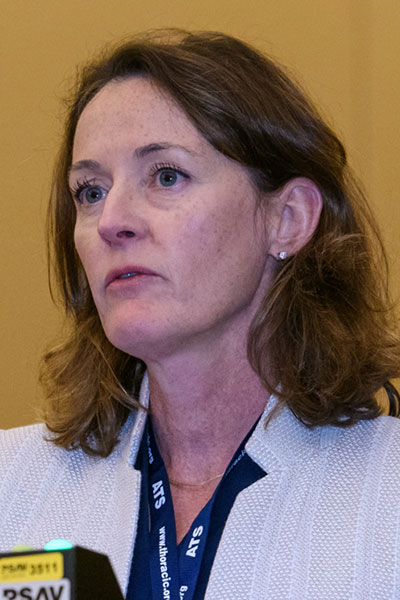Current ATS/European Respiratory Society (ERS) guidelines recommend the use of race-specific equations for the interpretation of spirometry. However, their use has recently been the subject of intense debate due to concerns that the equations may inappropriately normalize lower average lung function observed in Black and Asian populations.
In 2021, the ATS convened a diverse workshop panel of clinicians and investigators to evaluate the use of race and ethnicity in pulmonary function test (PFT) interpretation, make recommendations, and provide clinical guidance. Five research articles were subsequently published, which provided strong evidence to eliminate the use of race in PFT reporting and interpretation, leading to the publication earlier this year of Race and Ethnicity in Pulmonary Function Test Interpretation: An Official American Thoracic Society Statement in the American Journal of Respiratory and Critical Care Medicine.

“A confluence of recent scientific evidence, challenges to the use of race in many clinical algorithms, and increased attention to the impact of historical and current racism in the United States all make the work of the workshop group and the publication of this statement imperative,” session presenter and publication co-author Nirav R. Bhakta, MD, PhD, associate professor of medicine at the University of California, San Francisco, said.
During the session Race and PFTs: Use, Controversies, and Alternatives, members of the workshop panel and co-authors of the ATS statement discussed the potential harms and benefits of race-specific equations and proposed alternatives to their use.
Sanja Stanojevic, PhD, assistant professor in the Department of Community Health and Epidemiology at Dalhousie University in Halifax, Nova Scotia, Canada, provided an overview of the scientific justification for, potential benefits of, and potential harms from the use of race-specific equations in the interpretation of PFTs.

“We know that race and ethnicity are socio-political constructs — they vary in time, and the definitions of race and ethnicity differ between the countries where people live,” Dr. Stanojevic said. “Looking back at the evidence that we use to justify the use of ethnic- or race-specific equations, we have to recognize that these differences are not biological and that the labels that we assign are not biological and, in fact, we’ve just been normalizing the disparities in these populations.”
Moving forward, she said researchers must continue to refine and update PFT reference equation recommendations that better reflect the populations they serve.
“We don’t know whether we’ll ever find an ideal population that represents the ideal lung health for us to use as a benchmark to compare to everyone or whether reference equations are even the most appropriate way forward,” Dr. Stanojevic said. “While we don’t have all of the answers yet, we certainly have identified key gaps in our knowledge and research strategies to fill in those gaps.”

Aaron Baugh, MD, assistant professor at the University of California, San Francisco, discussed race-specific versus race-neutral equations and the importance of considering social and environmental conditions to improve the interpretation and clinical application of PFT reports.
“Over the years, we’ve seen more and more discussion about anthropometric arguments about group differences in lung function and less and less consideration of social differences. But, at long last, we have begun to catch up and found better ways to capture social and environmental exposures,” Dr. Baugh said. “We’re coming into a much more complex world of lung function interpretation, but I believe that our clinicians are nuanced enough, that our medical education is aware of social determinants of health enough, and that our research techniques have become advanced enough that we can tolerate this additional complexity.”

Rosemary Adamson, MBBS, ATSF, associate professor in the Division of Pulmonary and Critical Care Medicine at the University of Washington, discussed the move from race-specific toward race-neutral reference equations and the implications for care and impact on health disparities.
“This change from using race-specific PFT equations to race-neutral, or indeed some other form of evaluation of lung function, represents part of a paradigm shift that we’re experiencing in medicine, moving from a race-based to a race-conscious approach,” Dr. Adamson said. “Although there are potential downsides to the use of race-neutral equations, if we embrace the concepts of race consciousness and that race is an important thing for us to continue to think about because it has dramatic implications for health, we can look at the underlying causes for disparities and work on changing those.”

Meredith C. McCormack, MD, MHS, associate professor of medicine and medical director, Pulmonary Function Laboratory at Johns Hopkins University, discussed current interpretation strategies and the need for continuing research to inform future pulmonary function testing strategies.
“As we think about new recommendations and updates in our standards, we must think about how we interpret pulmonary function testing, and then specifically how we apply reference equations with a move toward a universal or a global approach,” Dr. McCormack said. “When we look at a race-neutral or a universal approach for all, it must improve our ability to link lung function to outcomes of interest, outcomes that we care about, like symptoms, disability, and mortality. We need to continue to collect data to understand lung health and lung function that predicts disease, and we need to do this in diverse populations, not just in the U.S., but around the world.”
Don’t Miss ATS 2024 Highlights: On Demand
Don’t forget that ATS 2024 Highlights: On Demand are available to all conference registrants! On Demand will give you access to the Opening Ceremony, Plenary Session, Keynote Series, Clinical Year in Review, Adult Clinical Core Curriculum, and so much more. The topics will cover ILD, asthma, health equity, and CF, to name just a few. On Demand content will be accessible to all ATS 2024 full conference and On Demand registrants until March 2025.
